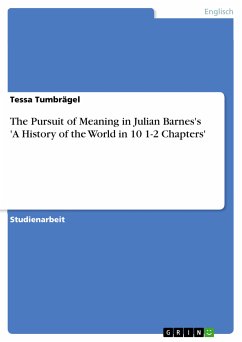Studienarbeit aus dem Jahr 2012 im Fachbereich Anglistik - Literatur, Note: 1,0, Universität Passau, Sprache: Deutsch, Abstract: To the new generation of postmodern writers, particularly from the western hemisphere, the idea of „meaning‟ and „essential truth‟ is a relict from the past, an old-fashioned and embarrassing concept that has no validity in a heterogeneous world. In postmodern times, the notion of „meaning‟ has become questionable, even contestable. There reigns a deep-rooted distrust of any „big idea‟ which presumes to account for an overall representation of life disregarding its heterogeneity. Hence, the metaphysical systems of the “grand narratives” (Wakefield 1990: 22) of the pre-postmodernist era can no longer be accepted as final authorities for the sovereignty of interpretation. In my term paper, however, I a m going to demonstrate that the idea of meaning and its pursuit is not dead in Julian Barnes‟s fifth novel A History of the World in 10 ½ Chapters (HW). Although it is often - and in my view unjustly- referred to as a perfect example of postmodern fiction, the novel rather plays with postmodern philosophies and frequently questions them without ever constructing certainties. This is especially true in relation to Barnes concept of history, the main theme of the novel. In fact, it is a rather depressing concept since history is portrayed as an arbitrary collection of stories which “are put together in the same ways that novelists use to put together figments of their imaginations to display an ordered world, a cosmos, where only disorder or chaos might appear” (White 1978: 125). In this manner, the author subtly unsettles our common imaginations of history and historiography and demonstrates that, in the end, everything is largely fictional. Confronted, however, with the postmodern scepticism of knowledge and values, Barnes does not deny the human longing for patterns of order and stable contexts of reference. This undeniably schizophrenic or at least inconsistent attitude of the notion of meaning will be further analyzed throughout my term paper. First of all, I am going to have a closer look on Barnes‟s relationship towards the postmodern crisis of meaning and, with regard to that, his concept of history epitomized in A History of the World - 2 - in 10 ½ Chapters. Subsequently, I will then examine its implications on the pursuit of meaning and its metamorphoses – the search for religion, art and love – and investigate how they are used as means against the cruelty of history.

